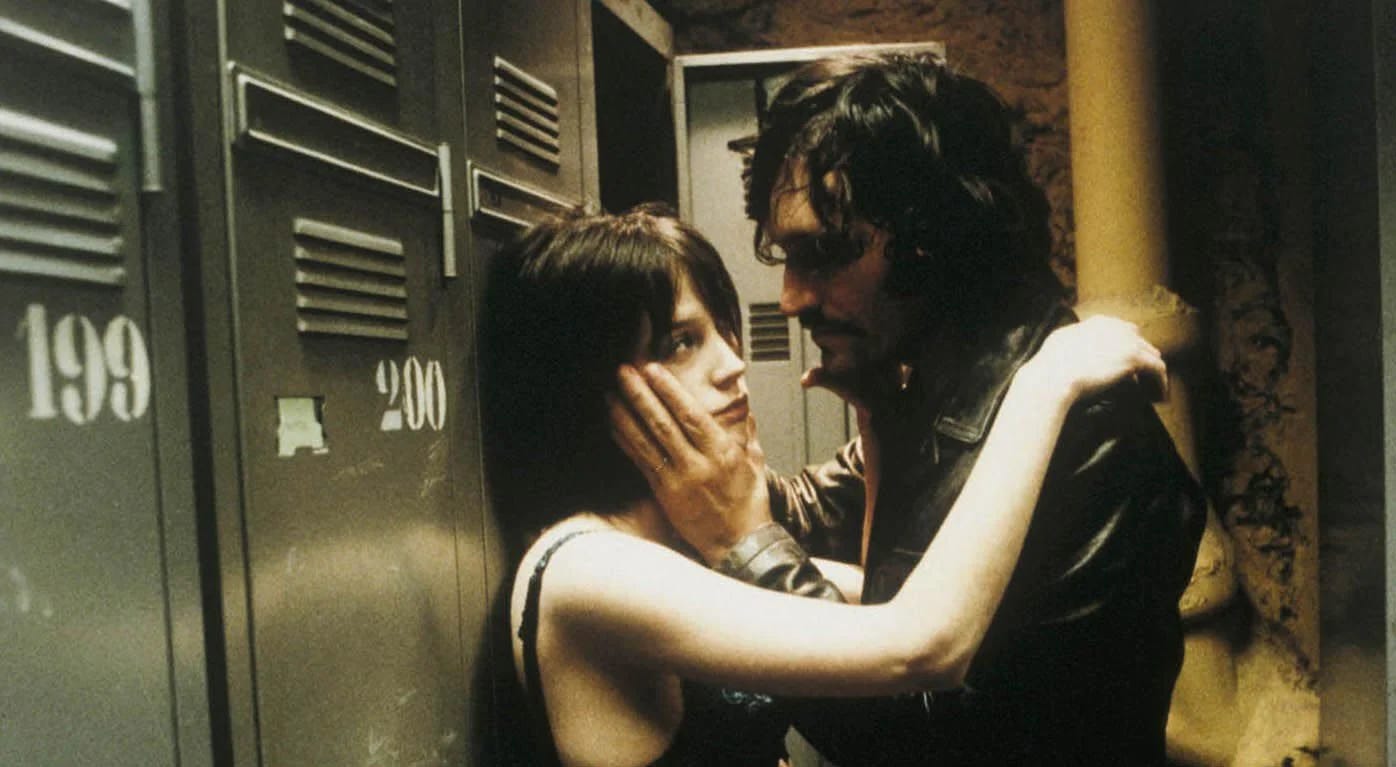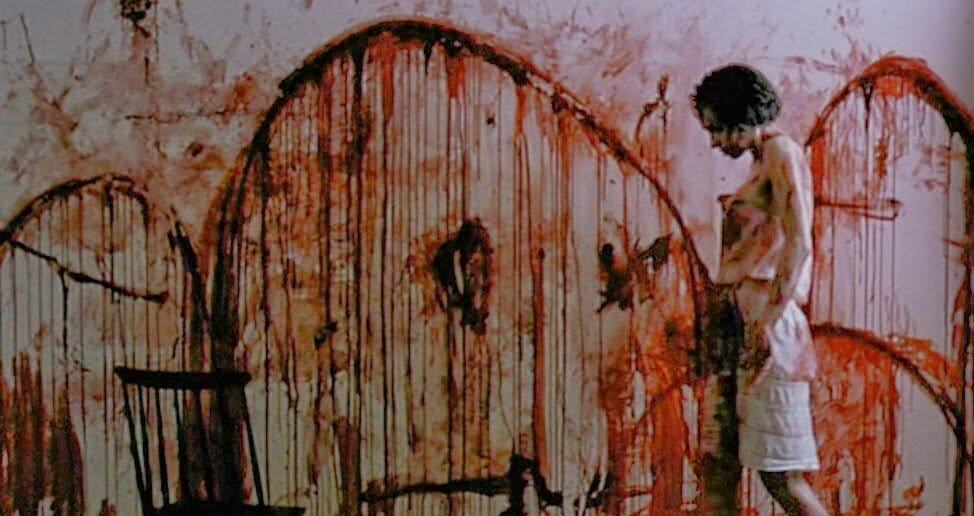The New Cult Canon: 'Trouble Every Day'
Very few reviewers—your humble New Cult Canonizer excluded—had kind things to say about Claire Denis' grisly erotic horror film. But as the Denis cult has grown, so have critical reassessments.
“I don’t want to wait anymore, Leo. I want to die.” — Béatrice Dalle, Trouble Every Day
When director Claire Denis brought Trouble Every Day to the festival circuit in 2001, it was greeted with a response that could kindly be called ambivalence but more accurately called hostility. I’ve always been proud that this film was the first that ever blurbed one of my reviews, though I’ve always understood that this was because nearly every other critic in America at the time, with the notable exception of Glenn Kenny in Premiere, absolutely detested it. Trouble Every Day has since won a much wider appreciation, buoyed perhaps by Denis’ reputation as one of France’s (and the world’s) finest directors—a J. Hoberman pan in the Village Voice gave way to a Melissa Anderson ”second look” essay in 2013—and its re-contextualization as part of the “New French Extremity,” a blanket term for the wave of art-horror that has emerged from the country in the 21st century. Like many future cult movies, it was an orphan that finally found a home.
To call Trouble Every Day a horror film may be technically accurate, given its allusions to classics like Cat People and Dr. Jekyll and Mr. Hyde, and the gory spectacle of humans whose erotic urges tip into the cannibalistic. But it has just as much in common with Denis’ follow-up, the enchanting 2002 romance Friday Night, another film caught up in forbidden nocturnal desire. There was no easy classification for Trouble Every Day in 2001, because the “New French Extremity” hadn’t really gotten started yet and critics anticipated a different type of work from Denis, who’d just made Beau Travail, a dazzlingly sensual and elliptical twist on Billy Budd, and hadn’t dabbled in genre as she would in later years, with the bloody 2013 thriller Bastards or the 2018 sci-fi curiosity High Life. One obvious sign that Denis had made a wholly original work was that there was no place for it.
The Reveal is a reader-supported newsletter dedicated to bringing you great essays, reviews and conversation about movies (and a little TV). While both free and paid subscriptions are available, please consider a paid subscription to support our long-term sustainability.
Times have changed. Strands of the film’s DNA are present in the sci-fi eroticism of Jonathan Glazer’s Under The Skin, about a beautiful alien who obliterates the bodies of the men she seduces, or Julia Ducournau’s Raw, a gruesome art-horror film about veterinary students who develop a taste for flesh. Still, Trouble Every Day remains difficult for the same reason it’s so uniquely bewitching: The line between consuming desire and a desire to consume is disturbingly thin here, and it becomes the line between love and death. Here’s a film where subtle shifts in breathing patterns turn humans into animals, as soft huffs of pleasure lead to the harder, deeper inhalations of the violently possessed. Through her modern take on vampirism, Denis has fashioned a grisly allegory of romantic desire and devotion.
From the start, the somber mood is set by the title track by Tindersticks, the English chamber pop artists led by Stuart A. Staples, whose deep yet lilting voice is the aural equivalent of a curl of smoke drifting to the rafters. (Funny story: The film’s short-lived American distributor, Lot 42, released it early in Los Angeles for an Oscar-qualifying run, in the hope that “Trouble Every Day” would be an Original Song nomination. Lot 42 president Jeff Lipsky told me at the time that Staples’ heavy repetition of the title would give the film a boost on Oscar night.) Denis’ collaboration with Tindersticks has been an excellent mood-setter on all of their films together—others include White Material, 35 Shots of Rum, L’Intrus, Friday Night, and Nanette et Boni—but it’s critical here in emphasizing the passion and melancholy that underscores this macabre premise.
“Look into my eyes, you see trouble every day,” the song begins, and that’s certainly the reality for Leo (Alex Descas), a doctor and brain researcher whose wife Coré (Béatrice Dalle) is making all kinds of trouble. In an early scene, we witness Leo quietly cleaning up after Coré has seduced and attacked a truck driver, tenderly dabbing the blood from her mouth like a parent would a messy infant. Leo hopes the situation is temporary: He keeps her under lock-and-key in their home and researches some cure for her vampiric condition. Meanwhile, a pair of American newlyweds, Shane (Vincent Gallo) and June (Tricia Vessey), arrive in Paris on their honeymoon, but Shane’s own urges make him a distractible partner as he desperately seeks out Leo.
None of this plotting concerns Denis much. We hear some vague business about Leo creating an experimental drug in Guyana that should not have been tried on humans. (That Leo’s materials are plant-based makes an odd connection to High Life, which emphasizes the organic in outer space, including a lush garden area on the ship.) Trouble Every Day is much more interested in the lengths people will go to protect those they love, even if it means putting up with those times when Jekyll turns into Hyde. Leo and Coré have reached the “in sickness and in health” point in their relationship, and, needless to say, the union transcends most considerations of basic morality. But Coré is beyond help, imprisoned by her animal urges like Irena Dubrovna in Cat People, and Leo’s instinct to protect her is partly tied to his guilt in feeling responsible for her sickness. Marriages are messy that way.
As for Mr. and Mrs. Brown, Shane is first shown holding his new wife close on the plane and kissing her, but when he retreats to the bathroom, he’s overwhelmed by fantasies of her covered in blood. He’s determined to suppress such thoughts and protect June from harm, but even as he searches Paris for Leo and possible help, his predatory instincts come alive. When the pretty maid at his hotel gives him a look, she becomes the gazelle in an urban savanna, and it’s only a matter of time before he can cease to contain himself. The film’s extraordinary final shot suggests what we’re willing to accept in a marriage—and, to no small degree, what we’re willing to wall off from the conscience.
The two major sex-and-death scenes are immensely disturbing, but they have a similar pattern, with Caré or Shane throwing themselves into a passionate extramarital tryst before they ravage their partner literally rather then just figuratively. (The one obvious difference is that Shane’s attack reads as a rape instead of just a murder in part because he’s been stalking the maid for so long and appears uninvited. Caré’s victim has broken into the house and tears down boards to get to her.) One fascinating element, is that, in Friday Night, which wouldn’t come out until the following year, Denis gives the sex a similar erotic charge, right up to the point where things take a grisly turn. Her camera doesn’t gaze at the money spots, but at the less-expected contours of the body, small thrushes of hair or the angles of the mouth and eyes as they come alive with pleasure. Having just directed 1999’s Djibouti-shaker Beau Travail, with its images of hard-bodied French legionnaires training on an African beach, Denis knew how to make bodies hum on screen.
Denis’ unwillingness to hold back on the violence that follows naturally limited the audience for Trouble Every Day, and her disinterest in convention made it a turn-off for the horror crowd, too. And so the film’s very narrow target audience are those who respond to Denis’ work and have the stomach for the shocking places she’s willing to go. The reward is a singular achievement, an erotic horror film that ventures to the extremes of desire and death in order to test the elasticity of love itself. The band doesn’t snap easily.
Trouble Every Day is currently streaming on Shudder, as part of a series on the New French Extremity.
Next: Mother!







It certainly helped Denis execute her vision that she had on hand Beatrice Dalle, who had cultivated a voracious and heedless persona both onscreen and off. "Feral" was an oft-used adjective to describe her in those days -- she really was unlike anybody else.
Scott, given how much audiences turned away from this, I have no idea what my personal response would be, but the way you write about it here, with such affection, makes it sound like a fantastic concept. "Here’s a film where subtle shifts in breathing patterns turn humans into animals, as soft huffs of pleasure lead to the harder, deeper inhalations of the violently possessed. " this phrase alone is a great movie in the making